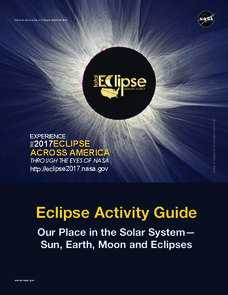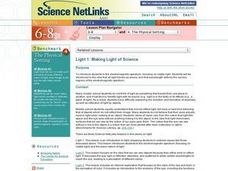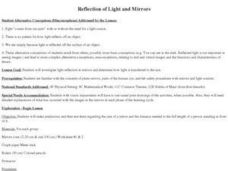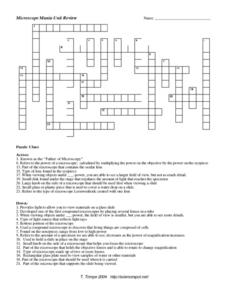NASA
Eclipse Activity Guide
Ever made solar s'mores? Or recreated the solar system using peanuts? Astronomers young and old investigate all things solar using a variety of activities. Explore how the sun works, types of light it emits, and methods of charting the...
Curated OER
TE Activity: Bubbling Plants
Students study a way to quantify the process of photosynthesis during a given time using the Elodea plant. They design a hypothesis that they test in the hands on activity. They compare the amounts of photosynthesis that occur during low...
Curated OER
Physics 152 ~ Fall 2003 Midterm Exam #3, Parts A, B
Illuminated physics stars show what they know about light by taking this exam. They match several related vocabulary terms to descriptions and answer multiple choice questions about the characteristics of light, magnification, and...
Curated OER
Solar Kit Lesson #13 - Solarize a Toy
Physical science or technology classes will be invigorated by this challenge: to convert a toy, game, or other device to run on solar power. In doing so, they will design the appropriate solar arrays. This is an A+ lesson, complete with...
National Energy Education Development Project
Introduction to Solar Energy
People have been using solar energy for many generations to dry crops, heat homes, and for light. This presentation explains how now it is possible to capture the solar energy and store it for future use, details how and where people use...
Curated OER
Bronx Cheer Bulb
If you chew or make a "raspberry" while viewing an LED light source, the light will appear to wiggle or flicker. It is not because of the light itself, but because of the vibration of your skull! Have your physics class give this a try...
Port Jefferson School District
Climate Patterns
Young climatologists explore the factors that contribute to a region's climate in this two-part earth science activity. To begin, learners are provided with a map of an imaginary planet and are asked to label global wind and ocean...
Curated OER
Making Light of Science
Young scholars investigate the electromagnetic spectrum, focusing on visible light. They are introduced to the idea that all light travels as waves, and that wavelength defines the various regions of the electromagnetic spectrum.
Curated OER
An Introduction to Light Unit-Third Grade
Third graders are introduced to light in an eight part unit which includes activities, additional resources, and rubrics for each part. Students address topics such as energy, reflection, absorption, and refraction through hands-on...
Curated OER
Edison and the Light Bulb
Students explore the impact of inventions on society, specifically Edison and the light bulb. In this technology lesson, students use online resources and listen to a story about Edison to develop an understanding of how the light bulb...
National Wildlife Federation
I’ve Got the POWER! Solar Energy Potential at Your School
Should every school have solar panels? The 19th lesson in a series of 21 has scholars research the feasibility of using solar panels at their school. They begin by gathering data on the solar energy in the area before estimating the...
Curated OER
Reflection and Refraction
What is a prism? A place for light waves that commit minor refractions! The thorough resource includes three hands-on investigations covering light reflection and refraction; mirrors, lenses, and images; and optical systems. Subject...
Cornell University
Making a Battery
Don't be shocked when your class has a blast making their own batteries! Science scholars examine a dry cell battery, then design and construct a wet cell battery. The activity guides them through the parts of a battery, the variables...
Cold Spring Harbor Laboratory
Some Types of Mutations Are Automatically Repaired
Does natural light damage or repair DNA? Learn the answer discover the scientists who researched the topic with an online interactive. Scholars read through an online animation presenting the content at their own pace. Then, they read...
PHET
Wave Interference
Why did the waves get into a fight? They were tired of each other's interference. Scholars observe the wave patterns from dripping water, sound waves, and light waves. They vary the spacing, build barriers, and increase the number of...
Science 4 Inquiry
Introducing the Types of Energy
Young scientists explore many different types of energy including light, heat, nuclear, sound, potential, and more. They match the types of energy and identify when energy transfers from one type to another.
PBS
Scale City — Inverse Proportions and Shadows in the Real World
Bring the resource out from the shadows. Viewers of a short video learn about drive-in theaters and how operators project images onto a large screen. They then perform an experiment to determine the relationship between the distance of...
Curated OER
The Grating Spectrometer; Light and Wavelengths
Students create a paper model that demonstrates wave interference for 3 wavelength from 2 sources. In this light and wave instructional activity, students use a real spectrometer and observe and measure the wavelength of spectral lines....
Curated OER
Reflection of Light and Mirrors
Students address common misconceptions concerning reflection, light and mirrors. They investigate light reflection in mirrors and determine how light is transferred to the eye. In addition, they make predictions and then test them...
Curated OER
Move Heat Light Sound
In this identifying the energy used by objects activity, students observe pictures of household items and write the words move, heat, light, or sound to tell their energy source. Students write 12 answers.
Curated OER
Got Light!
Sources of light, and the reflection of light off of objects, are the focus of this brief and simple science learning exercise. Learners must trace the path that light takes which enables a boy to read a book. A suggested activity is to...
Curated OER
Energy for Earth: The Sun
Super science learners examine the sun's production of energy by the process of nuclear fusion. Hands-on activities make this lesson engaging for middle schoolers. The lesson is made up of four parts. Part I is an introduction to the sun...
Curated OER
Microscope Mania Unit Review
In this microscope worksheet, high schoolers complete a crossword puzzle given twenty three hints about the parts of a microscope, the magnification of a microscope and the types of microscopes.
Curated OER
Sources of Energy
Students research various methods for preparing food and analyze energy sources. They explain that radiation, light, and heat are forms of energy used to cook food, treat diseases, and provide energy.

























